Arts & Entertainment
Theatrical highs
Many stellar gay-helmed productions infused D.C. stage scene
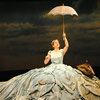
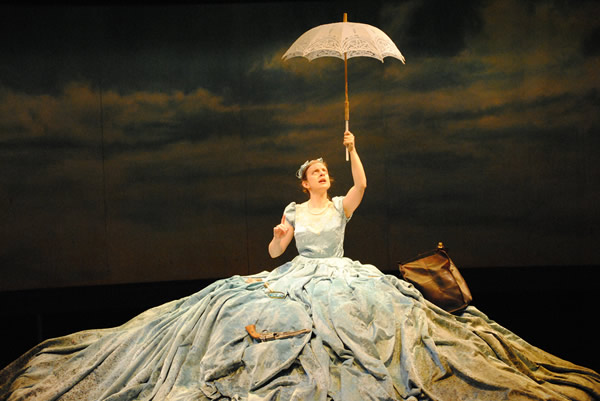
Delia Taylor as Winnie in WSC Avant Bard’s production of Samuel Beckett’s ‘Happy Days.’ (Photo by Dru Sefton; courtesy WSC)
It was a particularly good year for Washington theater. Included among the many solid offerings were numerous shows made by and about LGBT people.
Woolly Mammoth presented works by rising gay playwrights Robert O’Hara and Samuel D. Hunter. O’Hara’s autobiographical comedy “Bootycandy,” about growing up black and gay in America, follows the misadventures of young Sutter as he grapples with finding his place in the world and his own burgeoning sexuality. O’Hara — who also directed — led a terrific design team and got some great comedic performances from a talented five-person ensemble who portrayed a much larger number of characters ranging in age, portrayed many more characters ranging in age, sexual orientation and gender.
Hunter’s “A Bright New Boise” is a dark comedy set in the break room of a big box store in Idaho. Woolly’s production was staged by gay director John Vreeke and featured an finely drawn performance from gay actor Michael Russotto.
Leading dramatists were honored. In the spring, Arena Stage celebrated the work of Edward Albee with a festival featuring the gay playwright’s entire canon (mostly staged readings). The festival’s centerpiece were fully staged productions of Albee’s searing domestic drama “Who’s Afraid of Virginia Woolf?” which starred Tracy Letts and Amy Morton as the boozy, battling spouses George and Martha; and Albee’s more recent work “At Home at the Zoo,” a riveting peek into the lives of three New Yorkers.
At the same time, the Georgetown University Theater and Performance Studies Program presented an equally ambitious celebration of another gay playwright’s stunning oeuvre: the Tennessee Williams Centennial Festival (Tenn Cent Fest for short). Included in the extensive, multidisciplinary program was a production of “The Glass Menagerie” featuring Sarah Marshall, who is gay, as the former Southern belle matriarch Amanda Wingfield, who’s based on the playwright’s overbearing mother.
In May, the Kennedy Center presented “Follies” (gay composer Stephen Sondheim’s paean to ex-chorines and messy relationships) starring Bernadette Peters. Staged by local gay director Eric Schaeffer, it was a little uneven but boasted a sublime second act. Since its run here, an improved version of the same production moved on to Broadway and is slated for a limited Los Angeles run in the spring.
At Synetic Theater, gay actor Philip Fletcher continued to do amazing things with his body during 2011. A longtime regular with the movement-based theater group, Fletcher played Edmund in a stunning, punk rock “King Lear” in April, and in October he reprised his role as the most maniacal third of a triadic Iago in “Othello.”
At WSC Avant Bard in Rosslyn, director Jose Carrasquillo directed Delia Taylor (both gay) in a splendid production of Samuel Beckett’s daunting “Happy Days.” Tony Cisek — also gay — designed the set. In fact, Cisek designed sets for many productions throughout the year including Ford’s “Parade,” Folger’s “Othello” and “After the Fall” at Theatre J.
Other news from 2011: The Shakespeare Theatre Company’s gay artistic director Michael Kahn celebrated 25 years at the troupe’s helm; legendary (and lanky) Broadway choreographer Tommy Tune came to town to accept the Helen Hayes Tribute for an exceptionally successful career in theater; award-winning local actor Holly Twyford (who is gay) made an impressive directing debut at No Rules Theater Company with “Stop Kiss.” On a sadder note,Ganymede Arts, Washington’s only gay-specific theater closed, citing straightened finances as the main reason. The company was known for successfully staging works of special interest in LGBT audiences and for four years, it held fun fall arts festival, which attracted cool notables like Karen Black, Charles Busch and Holly Woodlawn.
For Helen Hayes Award-winning actor and DC theater scene veteran Rick Hammerly, 2011 was an especially busy and professionally fulfilling year. In addition to acting in the Kennedy Center’s long-running “Shear Madness,” the Tenn Cent Festival’s “And Tell Sad Stories of the Deaths of Queens…,”and most recently as Mr. Fezziwig in “A Christmas Carol” at Ford’s Theatre, he also produced “Magnificent Waste” for Factory 449, a progressive theater company that he and a small group of other theater artists founded several years ago.
And in what Hammerly describes as the highlight of his year, he staged a timely production of “Dead Men Walking” at American University in the fall. The play was created for universities by Tim Robbins through his Dead Man Walking School Theatre Project. It closely follows Robbins’ 1995 award winning film adaptation of the book by Sister Helen Prejean, based on her time spent with Death Row inmates.
“The experience gave me the opportunity to introduce the students to the power of theater — what it can really accomplish if you’re tackling things that are current. We used the story of Troy Anthony Davis’ execution in the play to tie what’s taking place on stage to something that is actually happening in the world. It demonstrated the strength of art and theater.”

A protest was held outside of the White House on Saturday following the killing of Renee Nicole Good by a U.S. Immigration and Customs Enforcement agent in Minneapolis. Across the Potomac, picketers held signs calling for “Justice for Renee” in Tysons, Va.
“ICE Out For Good” demonstrations were held in cities and towns across the country, according to multiple reports. A march was held yesterday in Washington, D.C., as the Blade reported. Further demonstrations are planned for tomorrow.
(Washington Blade photos by Michael Key)
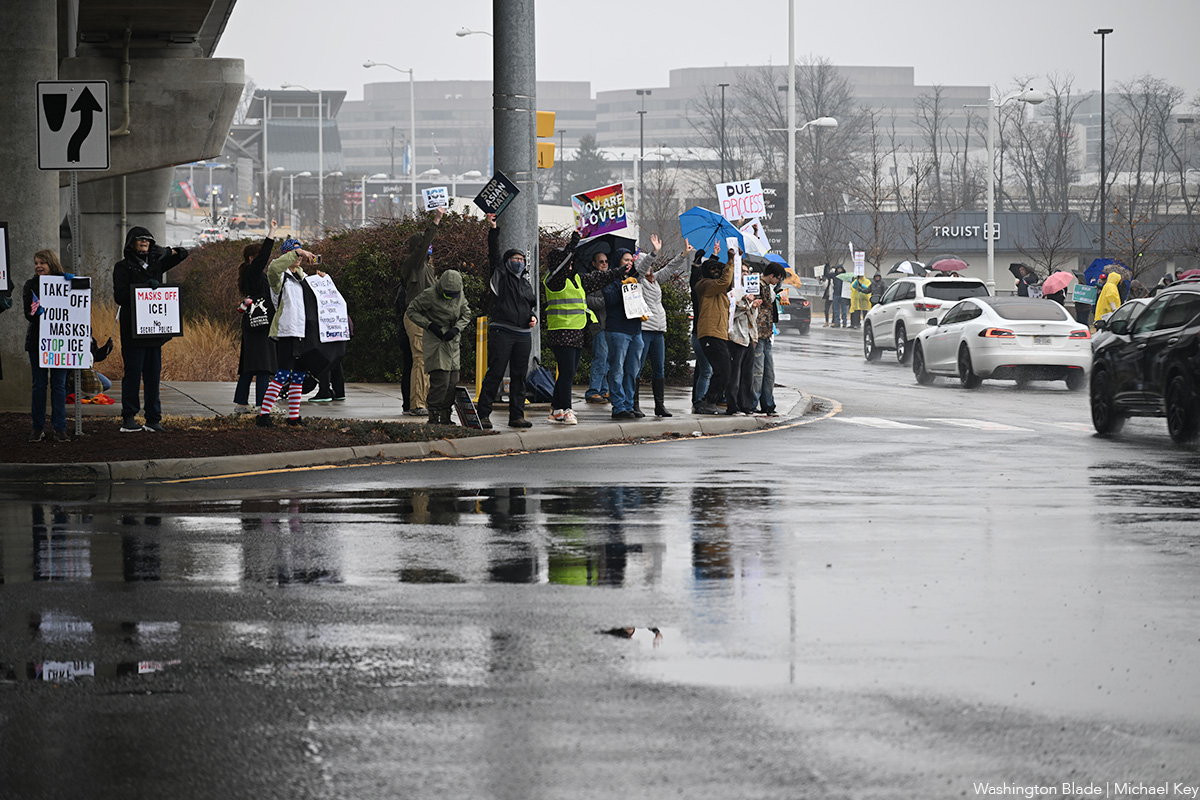
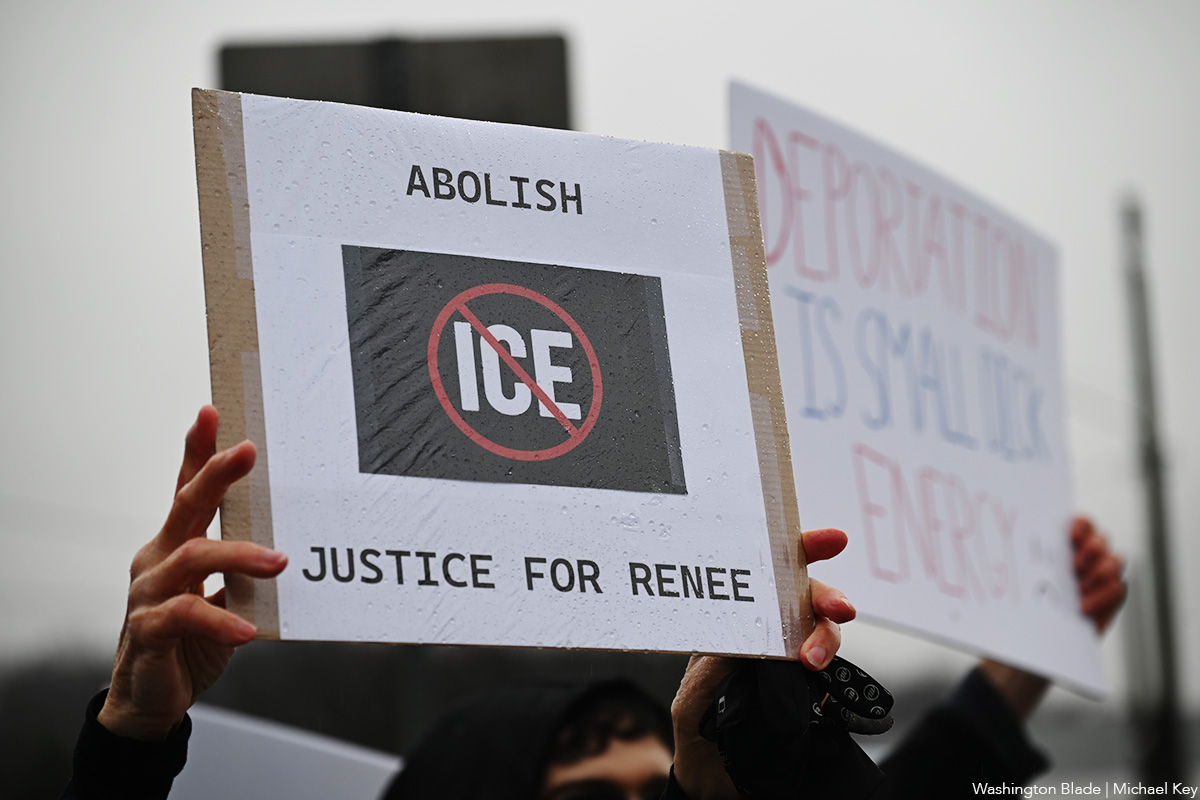
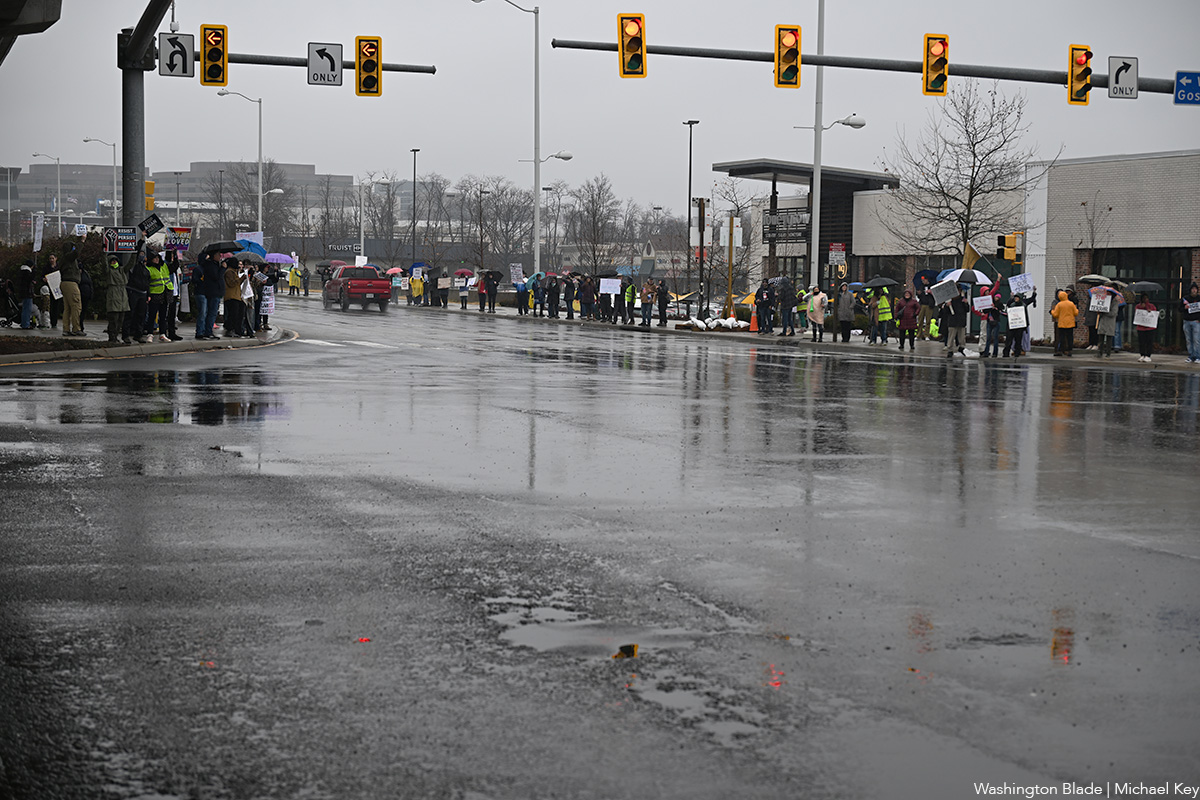
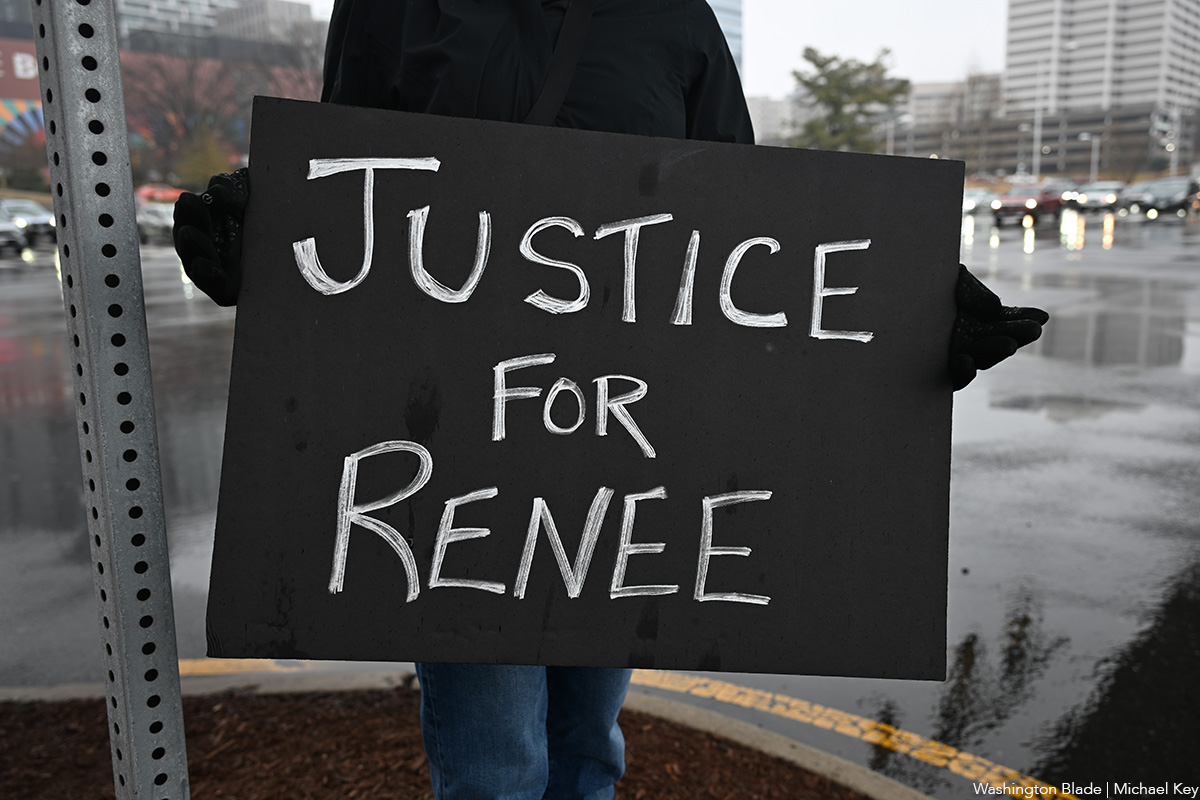


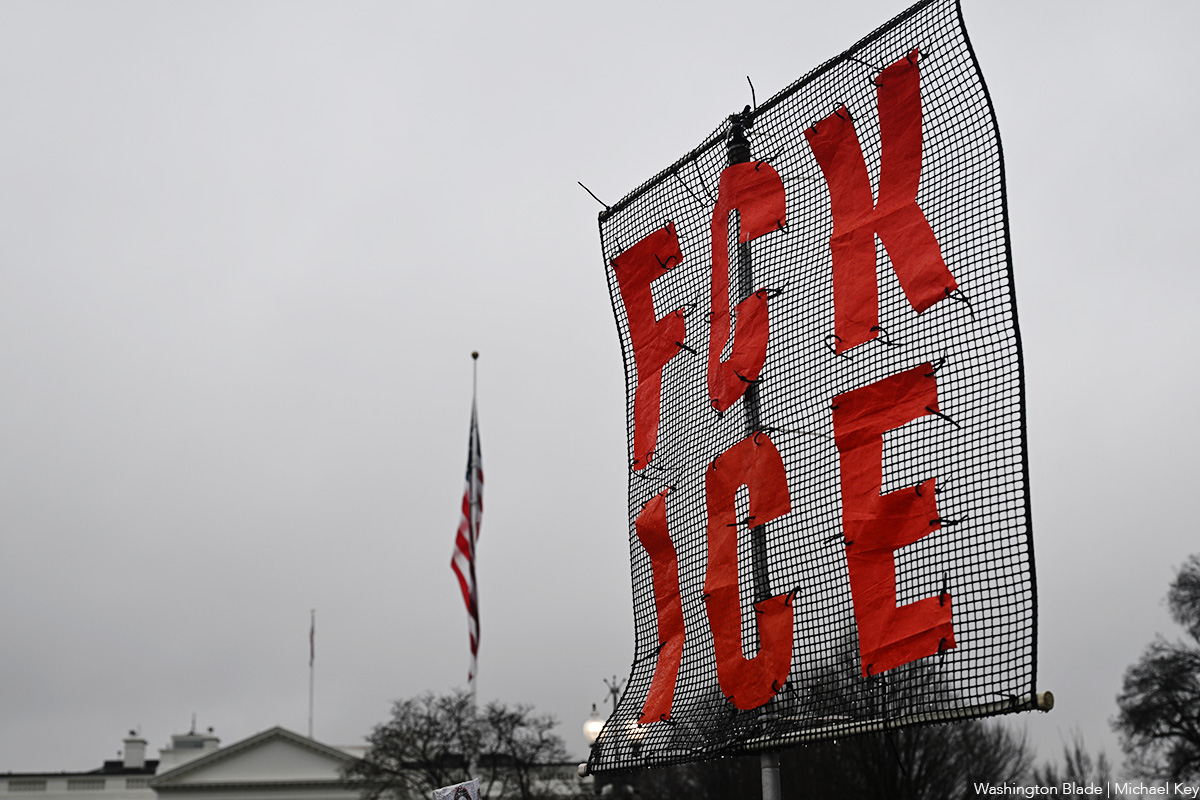
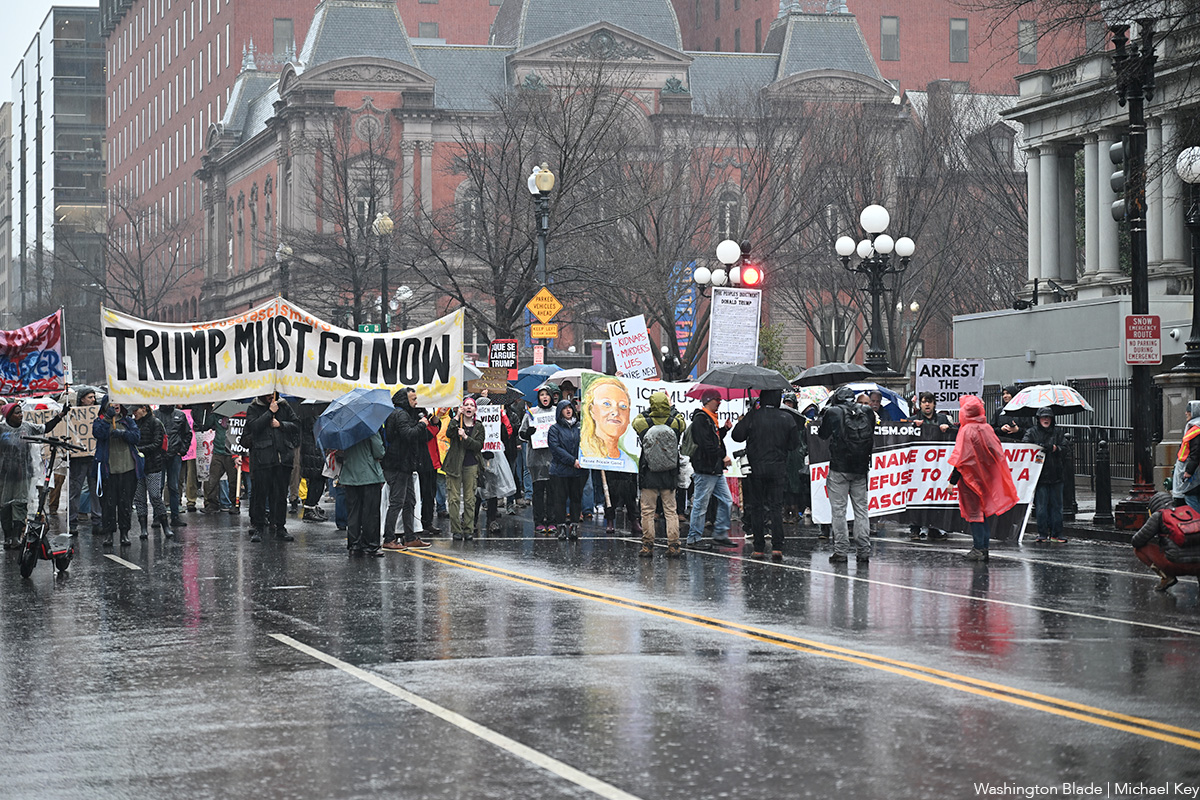

Books
Feminist fiction fans will love ‘Bog Queen’
A wonderful tale of druids, warriors, scheming kings, and a scientist
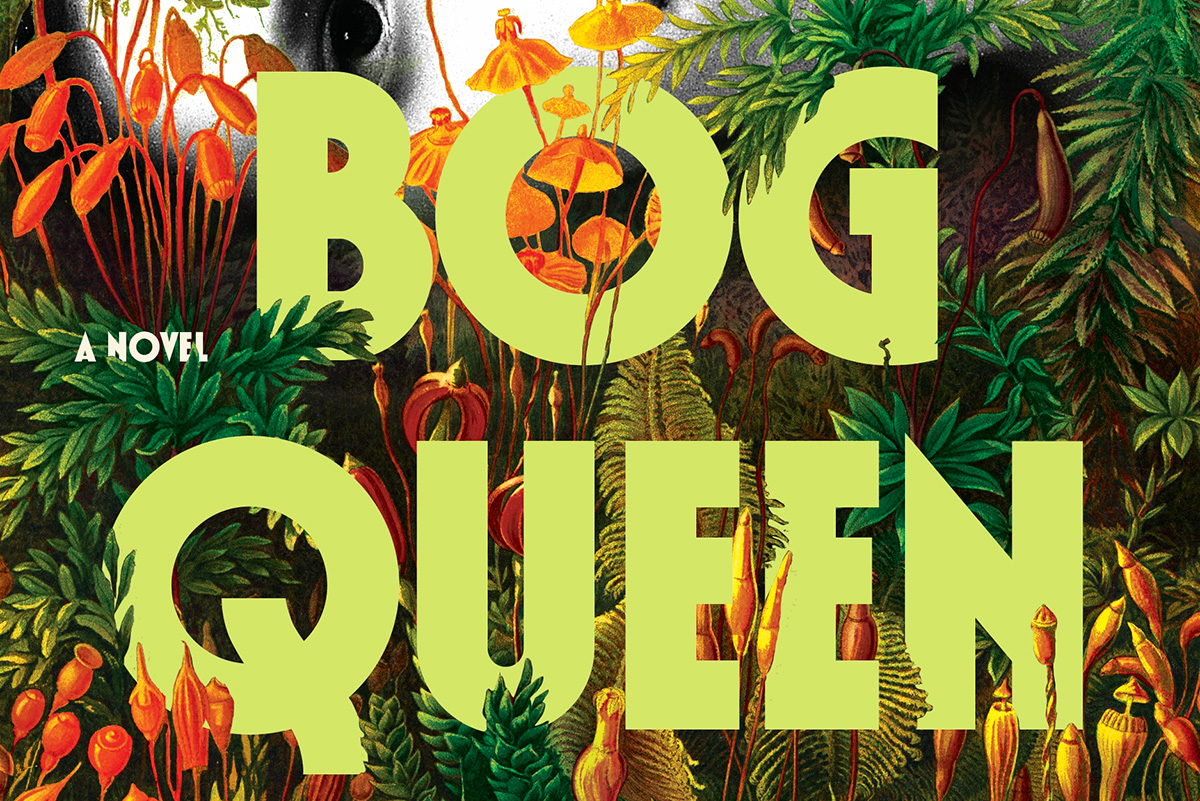
‘Bog Queen’
By Anna North
c.2025, Bloomsbury
$28.99/288 pages
Consider: lost and found.
The first one is miserable – whatever you need or want is gone, maybe for good. The second one can be joyful, a celebration of great relief and a reminder to look in the same spot next time you need that which you first lost. Loss hurts. But as in the new novel, “Bog Queen” by Anna North, discovery isn’t always without pain.

He’d always stuck to the story.
In 1961, or so he claimed, Isabel Navarro argued with her husband, as they had many times. At one point, she stalked out. Done. Gone, but there was always doubt – and now it seemed he’d been lying for decades: when peat cutters discovered the body of a young woman near his home in northwest England, Navarro finally admitted that he’d killed Isabel and dumped her corpse into a bog.
Officials prepared to charge him.
But again, that doubt. The body, as forensic anthropologist Agnes Lundstrom discovered rather quickly, was not that of Isabel. This bog woman had nearly healed wounds and her head showed old skull fractures. Her skin glowed yellow from decaying moss that her body had steeped in. No, the corpse in the bog was not from a half-century ago.
She was roughly 2,000 years old.
But who was the woman from the bog? Knowing more about her would’ve been a nice distraction for Agnes; she’d left America to move to England, left her father and a man she might have loved once, with the hope that her life could be different. She disliked solitude but she felt awkward around people, including the environmental activists, politicians, and others surrounding the discovery of the Iron Age corpse.
Was the woman beloved? Agnes could tell that she’d obviously been well cared-for, and relatively healthy despite the injuries she’d sustained. If there were any artifacts left in the bog, Agnes would have the answers she wanted. If only Isabel’s family, the activists, and authorities could come together and grant her more time.
Fortunately, that’s what you get inside “Bog Queen”: time, spanning from the Iron Age and the story of a young, inexperienced druid who’s hoping to forge ties with a southern kingdom; to 2018, the year in which the modern portion of this book is set.
Yes, you get both.
Yes, you’ll devour them.
Taking parts of a true story, author Anna North spins a wonderful tale of druids, vengeful warriors, scheming kings, and a scientist who’s as much of a genius as she is a nerd. The tale of the two women swings back and forth between chapters and eras, mixed with female strength and twenty-first century concerns. Even better, these perfectly mixed parts are occasionally joined by a third entity that adds a delicious note of darkness, as if whatever happens can be erased in a moment.
Nah, don’t even think about resisting.
If you’re a fan of feminist fiction, science, or novels featuring kings, druids, and Celtic history, don’t wait. “Bog Queen” is your book. Look. You’ll be glad you found it.
Movies
A Shakespearean tragedy comes to life in exquisite ‘Hamnet’
Chloe Zhao’s devastating movie a touchstone for the ages

For every person who adores Shakespeare, there are probably a dozen more who wonder why.
We get it; his plays and poems, composed in a past when the predominant worldview was built around beliefs and ideologies that now feel as antiquated as the blend of poetry and prose in which he wrote them, can easily feel tied to social mores that are in direct opposition to our own, often reflecting the classist, sexist, and racist patriarchal dogma that continues to plague our world today. Why, then, should we still be so enthralled with him?
The answer to that question might be more eloquently expressed by Chloe Zhao’s “Hamnet” – now in wide release and already a winner in this year’s barely begun awards season – than through any explanation we could offer.
Adapted from the novel by Maggie O’Farrell (who co-wrote the screenplay with Zhao), it focuses its narrative on the relationship between Will Shakespeare (Paul Mescal) and his wife Agnes Hathaway (Jessie Buckley), who meet when the future playwright – working to pay off a debt for his abusive father – is still just a tutor helping the children of well-to-do families learn Latin. Enamored from afar at first sight, he woos his way into her life, and, convincing both of their families to approve the match (after she becomes pregnant with their first child), becomes her husband. More children follow – including Hamnet (Jacobi Jupe), a “surprise” twin boy to their second daughter – but, recognizing Will’s passion for writing and his frustration at being unable to follow it, Agnes encourages him to travel to London in order to immerse himself in his ambitions.
As the years go by, Agnes – aided by her mother-in-law (Emily Watson) and guided by the nature-centric pagan wisdom of her own deceased mother – raises the children while her husband, miles away, builds a successful career as the city’s most popular playwright. But when an outbreak of bubonic plague results in the death of 11-year-old Hamnet in Will’s absence, an emotional wedge is driven between them – especially when Agnes receives word that her husband’s latest play, titled “Hamlet,” an interchangeable equivalent to the name of their dead son, is about to debut on the London stage.
There is nothing, save the bare details of circumstance around the Shakespeare family, that can be called factual about the narrative told in “Hamnet.” Records of Shakespeare’s private life are sparse and short on context, largely limited to civic notations of fact – birth, marriage, and death announcements, legal documents, and other general records – that leave plenty of space in which to speculate about the personal nuance such mundane details might imply. What is known is that the Shakespeares lost their son, probably to plague, and that “Hamlet” – a play dominated by expressions of grief and existential musings about life and death – was written over the course of the next five years. Shakespearean scholars have filled in the blanks, and it’s hard to argue with their assumptions about the influence young Hamnet’s tragic death likely had over the creation of his father’s masterwork. What human being would not be haunted by such an event, and how could any artist could avoid channeling its impact into their work, not just for a time but for forever after?
In their screenplay, O’Farrell and Zhao imagine an Agnes Shakespeare (most records refer to her as “Anne” but her father’s will uses the name “Agnes”) who stands apart from the conventions of her town, born of a “wild woman” in the woods and raised in ancient traditions of mysticism and nature magic before being adopted into her well-off family, who presents a worthy match and an intellectual equal for the brilliantly passionate creator responsible for some of Western Civilization’s most enduring tales. They imagine a courtship that would have defied the customs of the time and a relationship that feels almost modern, grounded in a love and mutual respect that’s a far cry from most popular notions of what a 16th-century marriage might look like. More than that, they imagine that the devastating loss of a child – even in a time when the mortality rate for children was high – might create a rift between two parents who can only process their grief alone. And despite the fact that almost none of what O’Farrell and Zhao present to us can be seen, at best, as anything other than informed speculation, it all feels devastatingly true.
That’s the quality that “Hamnet” shares with the ever-popular Will Shakespeare; though it takes us into a past that feels as alien to us as if it took place upon a different planet, it evokes a connection to the simple experience of being human, which cuts through the differences in context. Just as the kings, heroes, and fools of Shakespeare’s plays express and embody the same emotional experiences that shape our own mundane modern lives, the film’s portrayal of these two real-life people torn apart by personal tragedy speaks directly to our own shared sense of loss – and it does so with an eloquence that, like Shakespeare’s, emerges from the story to make it feel as palpable as if their grief was our own.
Yes, the writing and direction – each bringing a powerfully feminine “voice” to the story – are key to the emotional impact of “Hamnet,” but it’s the performances of its stars that carry it to us. Mescal, once more proving himself a master at embodying the kind of vulnerable masculine tenderness that’s capable of melting our hearts, gives us an accessible Shakespeare, driven perhaps by a spark of genius yet deeply grounded in the tangible humanity that underscores the “everyman” sensibility that informs the man’s plays. But it’s Buckley’s movie, by a wide margin, and her bold, fierce, and deeply affecting performance gives voice to a powerful grief, a cry against the injustice and cruelty of what we fumblingly call “fate” that resonates deep within us and carries our own grief, over losses we’ve had and losses we know are yet to come, along with her on the journey to catharsis.
That’s the word – “catharsis” – that defines why Shakespeare (and by extension, “Hamnet”) still holds such power over the imagination of our human race all these centuries later. The circumstantial details of his stories, wrapped up in ancient ideologies that still haunt our cultural imagination, fall away in the face of the raw expression of humanity to which his characters give voice. When Hamlet asks “to be or not to be?,” he is not an old-world Danish Prince contemplating revenge against a traitor who murdered his father; he is Shakespeare himself, pondering the essential mystery of life and death, and he is us, too.
Likewise, the Agnes Shakespeare of “Hamnet” (masterfully enacted by Buckley) embodies all our own sorrows – past and future, real and imagined – and connects them to the well of human emotion from which we all must drink; it’s more powerful than we expect, and more cleansing than we imagine, and it makes Zhao’s exquisitely devastating movie into a touchstone for the ages.
We can’t presume to speak for Shakespeare, but we are pretty sure he would be pleased.
-

 Colombia4 days ago
Colombia4 days agoGay Venezuelan man who fled to Colombia uncertain about homeland’s future
-

 Arts & Entertainment4 days ago
Arts & Entertainment4 days ago2026 Most Eligible LGBTQ Singles nominations
-

 District of Columbia4 days ago
District of Columbia4 days agoKennedy Center renaming triggers backlash
-

 District of Columbia4 days ago
District of Columbia4 days agoNew interim D.C. police chief played lead role in security for WorldPride


















